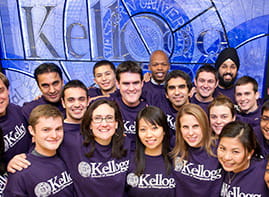From well-established multinationals to startups looking to gain traction, organizations today grapple with how to grow and what to scale. Rising global competition, technology advances, regulatory changes, barriers to entry, political uncertainties, and fissures within markets, industries, economies, and countries constantly change the playing field.
These broadly held assumptions, however, may not be the real issues. As distinguished leaders in business, social entrepreneurship, and education told nearly 2,000 attendees of the second annual
Kellogg on Growth conference, the first step to achieving growth is to dispel preconceived ideas about it—especially the conventional thinking around scarce and constricted resources.
“What if our true limit to growth is in the human capacity for shared understanding?”
Dean Sally Blount of the Kellogg School of Management challenged the audience in her opening remarks.
With that shift in thinking comes the opportunity to rely less on generating growth via conventional means such as leveraging, scaling, and cost efficiencies, and putting more emphasis on creating opportunities by understanding differences. When individuals and organizations grasp new insights, “growth is an outcome,” said Paul Leinwand ’98, U.S. Principal of Strategy&, which is part of PWC.
The importance of thinking differently about growth was echoed by guest speakers who spanned investment, professional services, consumer products, social entrepreneurship, and philanthropy. “We must leverage diversity of experience and perspective to get better outcomes,” said Leigh Morgan, chief operating officer of the Bill & Melinda Gates Foundation, the largest private philanthropic organization in the world. “In the end, the best solutions to the world’s hardest problems always emerge from collaboration across differences.”
Since its founding in 2000, the Gates Foundation has invested more than $39 billion in solving the world’s toughest problems in global health, economic development, and education. The foundation’s mission includes combating infectious diseases that impact the poor, as well as enabling people to improve their lives, such as through microfinance initiatives in developing countries.
“I’m actually incredibly positive about the direction the world is heading,” Ms. Morgan said, citing gains to combat diseases such as malaria and polio (the latter, nearly eradicated) and the empowerment of more women and girls. “These realities embolden me and, I hope, inspire us to do more.”
Jean Case, CEO of the Case Foundation, which generates both a financial and a social return, underscored the importance of “the power of the entrepreneurial spirit.” In philanthropy, entrepreneurial thinking and involvement has brought about the ability “to look at new ways of solving old problems.”
“We are seeing entrepreneurs and explorers looking at different ways to address sustainability,” added Ms. Case, who is also chairman of the National Geographic Society Board of Trustees.
Thinking differently, however, must also include recognizing underlying problems, including the unconscious biases that prevent equal access to opportunities. For example, 90 percent of venture capital goes to men, with only 10 percent invested in firms founded by women, and only 1 percent in firms with an African-American founder. In addition, nearly three-quarters of venture capital typically goes to startups in California, New York, and Massachusetts. “As we celebrate our startup economy, [we see] it has favored a small segment of society,” Ms. Case said. “There is a powerful opportunity if we can help more women and people of color.”
Small steps can lead to big changes. For example, addressing unconscious biases by ensuring there is diversity among the judges who listen to startup pitches and evaluate applications for funding. Another is to shift thinking away from seeking division between types of organizations and institutions—business, government, and social entrepreneurship—to seeking more collaboration and even some hybrid structures, Ms. Case observed.
These changes are underscored by the fact that while “economic growth is measured on the macroeconomic level, it is [implemented] at the microeconomic level,” as
Meghan Busse, an Associate Professor of Strategy at Kellogg, told the audience.
A critical part of microeconomic change is the individual entrepreneur who takes on the challenge of creating something new. “It’s a relentless pursuit of excellence,” said David Kabiller’87, founder and principal of AQR Capital Management, who with his partners left Goldman Sachs in the late 1990s to establish an investment startup.
“The only sustainable business is one that is solving problems. We are managing money, but we are also trying to solve problems—the retirement problem,” Mr. Kabiller said. “Be adaptive and innovative, and the world changes around you.”
For Brian Lee, CEO and Co-Founder of The Honest Company, which makes nontoxic and environmentally friendly consumer products, the key to solving problems is having passion and being fearless. His parting words for the audience, particularly the Kellogg students in attendance, was not to wait for more money, more time, or even more experience. “If you’re an entrepreneur, just go do it,” he said. “If you are thinking of starting something that you really believe in, you should have started yesterday. You’re a day behind—you should do it.”
That’s the kind of thinking that overturns assumptions, banishes preconceived notions, and alters the trajectory of individuals, firms, and entire economies. As Dean Blount observed, “We need brave leaders who will inspire lasting growth in people, organizations, and markets.”






